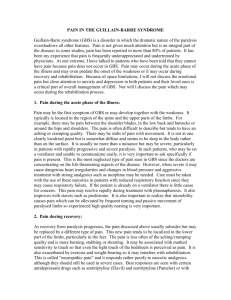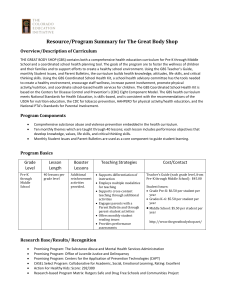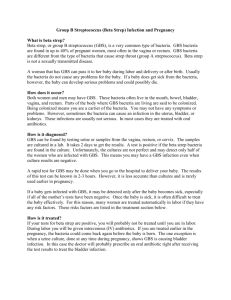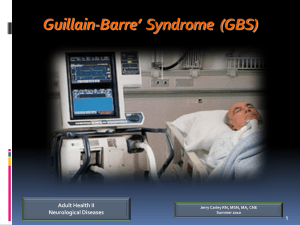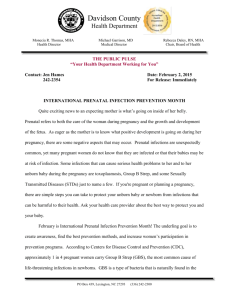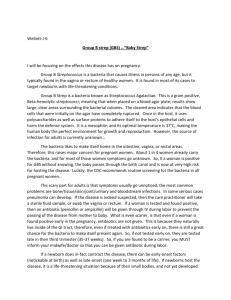Information for you Group B streptococcus (GBS) infection in newborn babies
advertisement
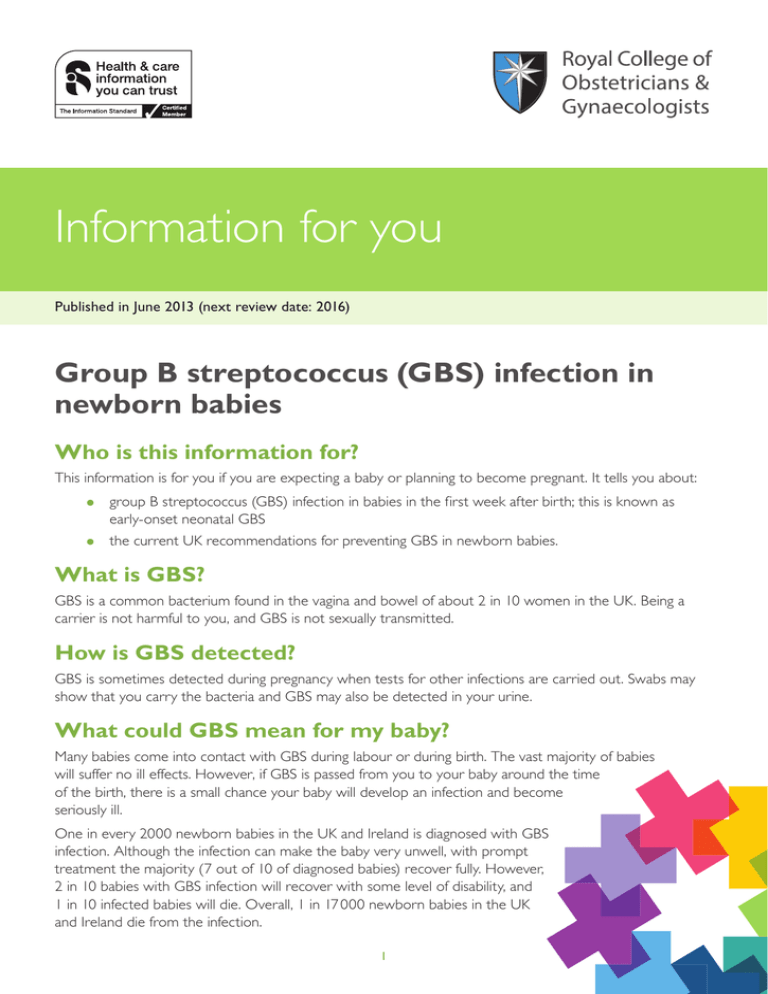
Information for you Published in June 2013 (next review date: 2016) Group B streptococcus (GBS) infection in newborn babies Who is this information for? This information is for you if you are expecting a baby or planning to become pregnant. It tells you about: • group B streptococcus (GBS) infection in babies in the first week after birth; this is known as • early-onset neonatal GBS the current UK recommendations for preventing GBS in newborn babies. What is GBS? GBS is a common bacterium found in the vagina and bowel of about 2 in 10 women in the UK. Being a carrier is not harmful to you, and GBS is not sexually transmitted. How is GBS detected? GBS is sometimes detected during pregnancy when tests for other infections are carried out. Swabs may show that you carry the bacteria and GBS may also be detected in your urine. What could GBS mean for my baby? Many babies come into contact with GBS during labour or during birth. The vast majority of babies will suffer no ill effects. However, if GBS is passed from you to your baby around the time of the birth, there is a small chance your baby will develop an infection and become seriously ill. One in every 2000 newborn babies in the UK and Ireland is diagnosed with GBS infection. Although the infection can make the baby very unwell, with prompt treatment the majority (7 out of 10 of diagnosed babies) recover fully. However, 2 in 10 babies with GBS infection will recover with some level of disability, and 1 in 10 infected babies will die. Overall, 1 in 17 000 newborn babies in the UK and Ireland die from the infection. 1 When might my baby be at higher risk of developing GBS infection? Infection is more likely to occur if: • your baby is born prematurely, at less than 37 weeks of pregnancy – the earlier your baby is born • • • the greater the risk you have previously had a baby who developed GBS infection you have a high temperature during labour more than 18 hours have passed between your waters breaking and your baby being born. How can the risk to my baby be reduced? • If you are known to be carrying GBS, you will be offered antibiotics once you are in labour to • • • • reduce the risk of your baby developing the infection. A urine infection caused by GBS should be treated as soon as it is detected. You should also be offered antibiotics during labour even if the infection has cleared up. If you have previously had a baby who was diagnosed with GBS infection, you will be offered antibiotics in labour. If you carry GBS, are more than 37 weeks pregnant and your waters break before you go into labour, you will usually be advised to have your labour induced (started off). This is to reduce the time that your baby is exposed to GBS before birth. If your doctors or midwives think you may have an infection during your labour but they are not sure of the cause, you should be offered antibiotics that will treat a wide range of infections including GBS. The antibiotic usually used is penicillin. If you are allergic to penicillin, you will be offered an appropriate alternative. Why would I not be given antibiotics for GBS during my pregnancy? • If you are a carrier, treating GBS with antibiotics before labour begins will not reduce the chance of passing it to your baby. This is because, in the majority of cases, GBS returns after the antibiotic course has finished and therefore it is usual to wait and offer you antibiotics when you go into labour. This has been shown to be effective in reducing infection in babies. • All women, whether or not they have GBS, whose waters break before 37 weeks of pregnancy • but who do not go into labour are offered a course of antibiotics. If you are a carrier of GBS, you do not need antibiotics specifically for GBS until you go into labour. If you are having a planned caesarean section, you will, like all women, be recommended to have antibiotics at the time of the operation to reduce the risk of infection. The antibiotics given will cover a range of infections and not be specifically for GBS. You will only need antibiotics for GBS if you go into labour or your waters break before the caesarean section. If I had GBS in a previous pregnancy should I be given antibiotics during labour? • If you were a carrier in a previous pregnancy but your baby was not affected, it is not currently recommended to have antibiotics during labour in this pregnancy. Fewer than 4 in 10 of previous GBS carriers will be carriers in subsequent pregnancies. 2 What will my treatment during labour involve? If you need antibiotics, it is best to start them as soon as possible after your labour begins. They will be given through a vein (intravenously). You should be offered further doses as necessary until your baby is born. If you need intravenous antibiotics, it may not be possible to give birth at home or in some midwife-led units. This may be a factor in deciding where to have your baby. If the antibiotics are given very late in labour or if your labour is already well advanced when you are admitted to the labour ward, the options for monitoring your baby’s health, or for treating your baby with intravenous antibiotics, should be discussed with you. The potential risks and benefits of each approach will be explained. What are the symptoms and signs of GBS infection? Most babies who are infected with GBS show symptoms within 12 hours of birth. If your baby is at increased risk of GBS infection, he or she will be monitored for signs of infection. This will include assessing your baby’s general wellbeing, feeding, temperature, heart rate and breathing rate. Babies with GBS infection may be very sleepy, be floppy and not feed well. Other symptoms can include grunting, a high or low temperature, abnormally fast or slow heart rate or breathing rate, irritability, low blood pressure, and low blood sugar. What tests and treatments are available for my baby? If it is thought that your newborn baby has an infection, tests will be done to see whether GBS is the cause. This may involve taking a sample of your baby’s blood, or a sample of fluid from around your baby’s spinal cord (a lumbar puncture). This will be discussed fully with you. Babies with signs suggestive of GBS infection should be treated with antibiotics as soon as possible. Because of this, doctors often advise giving babies antibiotics as soon as the infection is suspected. Treatment is then stopped if there is no sign of GBS after at least 24 hours, or if tests are negative. Are there any risks for me and my baby with antibiotics? Some women are allergic to certain antibiotics and in rare cases the reaction can be severe. Some women may experience temporary side effects such as feeling sick or having diarrhoea. Your doctor or midwife should discuss the benefits and risks of taking antibiotics during labour. Antibiotics can be life-saving when given to babies with GBS infection. However, research has linked antibiotics given to babies very early in their lives to a higher than normal risk of developing asthma and/or other allergies which can be serious. Can I still breastfeed? It is safe to breastfeed your new baby. Breastfeeding has not been shown to increase the risk of GBS infection, and it protects against many other infections. Why are all women not tested for GBS during pregnancy in the UK? There has been debate for many years as to whether all pregnant women should be offered testing for GBS. The RCOG guideline The Prevention of Early-onset Neonatal Group B Streptococcal Disease and the UK National Screening Committee outline the benefits and disadvantages of both views. 3 At present, there is no clear evidence to show that testing for GBS routinely would do more good than harm: • Many women carry the bacteria and, in the majority of cases, their babies are born safely and • • • • • without developing an infection. Screening all women late in pregnancy cannot predict which babies will develop GBS infection. No screening test is entirely accurate. A negative swab test does not guarantee that you are not a carrier of GBS. In other words, you may be given a negative result when in fact you do carry GBS in your vagina. In addition, the majority of babies who are severely affected from GBS infection are born prematurely, before the suggested time for screening. Giving all carriers of GBS antibiotics would mean that a very large number of women at very low risk would receive treatment they do not need. There is also the general risk from overuse of antibiotics leading to strains of bacteria becoming resistant. This is why screening all women in pregnancy to find GBS carriers is not routinely offered in the UK. Key points • Group B streptococcus (GBS) is one of many bacteria that normally lives in our bodies and usually • • • • • • causes no harm. About one-fifth of pregnant women in the UK carry GBS in their vagina. GBS carriage is not routinely screened for during pregnancy in the UK. The risk of GBS being passed from a mother to a baby is highest during labour or at the time of the birth. If GBS is found in your vagina or bowel during your current pregnancy, or if you have previously had a baby with GBS infection, you should be offered antibiotics during your labour. The risks are increased for babies born prematurely, if you have a temperature in labour, or when your waters break but labour is delayed by more than 18 hours. If your newborn baby develops GBS infection, he or she should be treated promptly with antibiotics. Breastfeeding does not increase the risk of GBS infection and will protect your baby against other infections. Further information UK National Screening Committee: www.screening.nhs.uk/groupbstreptococcus. NHS Choices: www.nhs.uk/chq/pages/2037.aspx. 4 Sources and acknowledgements This information has been developed by the RCOG Patient Information Committee. It is based on the RCOG guideline The Prevention of Early-onset Neonatal Group B Streptococcal Disease (July 2012). The guideline contains a full list of the sources of evidence we have used and is available at: www.rcog.org.uk/womens-health/clinicalguidance/prevention-early-onset-neonatal-group-b-streptococcal-disease-green-. The RCOG produces guidelines as an educational aid to good clinical practice. They present recognised methods and techniques of clinical practice, based on published evidence, for consideration by obstetricians and gynaecologists and other relevant health professionals. This means that RCOG guidelines are unlike protocols or guidelines issued by employers, as they are not intended to be prescriptive directions defining a single course of management. This information has been reviewed before publication by women attending clinics in Cheltenham, Winchester and Gillingham. A glossary of all medical terms is available on the RCOG website at: www.rcog.org.uk/womens-health/patientinformation/medical-terms-explained. A final note The Royal College of Obstetricians and Gynaecologists produces patient information for the public. The ultimate judgement regarding a particular clinical procedure or treatment plan must be made by the doctor or other attendant in the light of the clinical data presented and the diagnostic and treatment options available. Departure from the local prescriptive protocols or guidelines should be fully documented in the patient’s case notes at the time the relevant decision is taken. All RCOG guidelines are subject to review and both minor and major amendments on an ongoing basis. Please always visit www.rcog.org.uk for the most up-to-date version of this guideline. © Royal College of Obstetricians and Gynaecologists 2013 5
